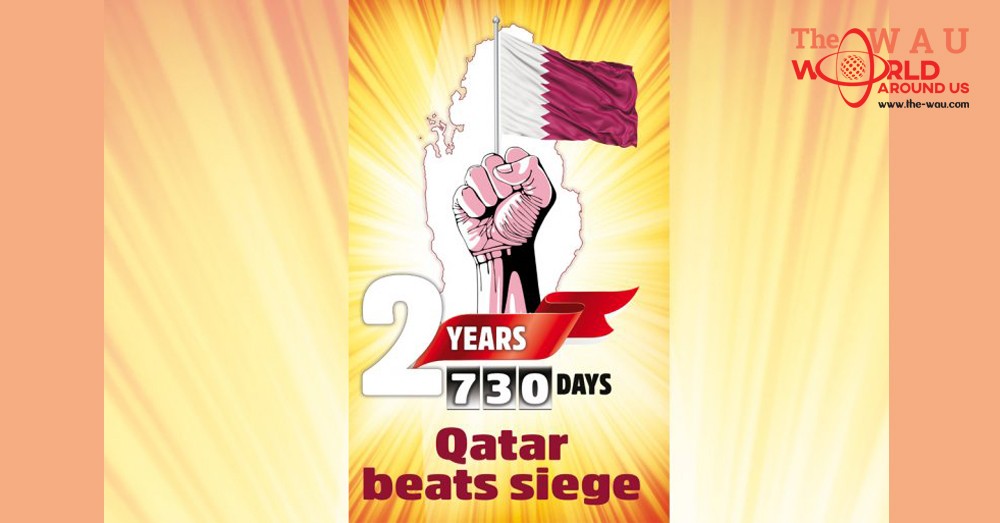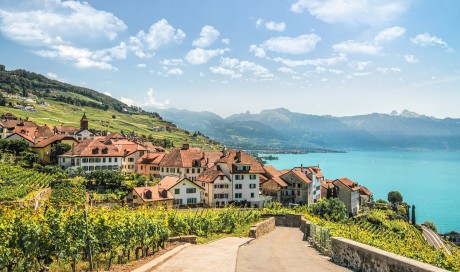Qatar’s grit and determination has defeated two years of siege. The unjust siege, which was imposed during Ramadan on June 5, 2017, has entered in its third year on the second day of Eid Al Fitr.
These two years have been the period of Qatar’s triumph against all odds. The country started and completed many world-class projects successfully, showing that Qatar’s indomitable spirit and strong determination is far more stronger than the evil intentions of blockading countries.
The intention of blockading countries behind imposing the siege was to create crisis for Qatar, but it turned into an opportunity.
During the last two years all the sectors of Qatar’s economy boomed and many ambitious mega project became reality. The multi-billion dollar project Hamad Port, one of the largest ports in the region, played a crucial role in breaking siege. The port, opened in 2017, emerged as Qatar’s main gateway to the world trade and ensured uninterrupted supply to the residents and all the sectors.
The 40,000-seater Al Janoub Stadium, the first brand new stadium built by Qatar, was officially opened last month, making it a memorable moment in the country’s sporting history. The opening ceremony came exactly two years after Qatar unveiled Khalifa International Stadium was unveiled in front of 50,000 fans who turned at the venue for the 2017 Amir Cup final.
The whole world watched in awe as Qatar opened the iconic National Museum of Qatar in March this year. The museum grabbed the attention of global media which described it as an immersive and experiential museum.
Qatar National Library was opened in November last year, making it first new national library to open anywhere in the world in this millennium. The library offers residents access to nearly one million books, periodicals, and special collections, including its famed Heritage Library.
Qatar Airways, which was denied to access to the airspace of by the blockading countries, continued with its expansion plans and expanded its network to several destinations globally, making it the fastest growing airlines in the world. Hamad International Airport also maintained its growth momentum and launched several new initiatives and project to further increase travellers convenience. Qatar Airways and Hamad International Airport have won many global awards and recognition in the last two years.
Qatar General Electricity and Water Corporation (Kahramaa) opened the Water Security Mega Reservoirs Project, which is the largest of its kind in the world, in Umm Salal Ali in December 2018. In March this year, Qatar Electricity and Water Company opened Umm Al Houl Power Plant, in Umm Al Houl with the capacity of generating 2,520 megawatt of electricity and 136.5 million gallon drinking water per day.
Qatar’s economy became resilient and kept moving on growth trajectory. Over 32,000 new companies have been established in Qatar during the on-going blockade, registering a 34 percent growth compared to the two years before the siege.
Qatar has made significant progress in food production in the past two years as local production of agricultural, fish, animal, and dairy products has jumped by 400 percent since 2017. Country’s self-sufficiency in food production jumped up after blockade rising fresh chicken to 124 percent and fresh milk to 106 percent to meet the local demand.
Sheikha Moza stressed commitment of Qatar to promote global education
United Nations Secretary General António Guterres re-appointed H H Sheikha Moza along with 16 influential public figures, as part of the 2019-2020 class of Sustainable Development Goals’ Advocates.
H H Sheikha Moza has been selected for a second time to be an Advocate of the Sustainable Development Goals, in recognition of her leading role in providing quality education, youth empowerment, and human development through her initiatives at the local and international level. Education Above All Foundation, of which H H Sheikha Moza is the chairperson – reached 10 million out of school children.
EAA’s Educate a Child programme together with international partners succeeded in its objective of helping 10 million of the most marginalised out-of-school children to receive quality, primary education.
H H Sheikha Moza has also pledged to help 335,000 children across 11 countries by 2021.
Hamad Port became Qatar’s gateway to world trade
Opening of Hamad Port, entailing investment of QR27.5bn, played a key role in breaking the blockade as it ensured normal supply goods in the country. Amir H H Sheikh Tamim bin Hamad Al Thani patronised the official inauguration of Hamad Port in Umm Al Houl on September 5, 2017.
Hamad Port witnessed commencement of new services in 2018, which further strengthened the port’s connectivity to Asian and European destinations with representation from all major global lines. It was the first year that a port in Qatar handled 1 million (Twenty-Foot Equivalent Units) TEU landmark and came in the ranks of the select container terminals around the world handling this volume.
In March 2018, Hamad Port celebrated handling of its first one million TEUs containers. The Port achieved this feat in less than 14 months, which is well ahead of its expected schedule.
Later in November last year, the Ministry of Transport and Communications celebrated the handling of over two million TEU and five million tonnes of cargo at Hamad Port until the end of October 2018.
Spread over 28.5 square kilometres, Hamad Port’s basin is 4km long, 700 metres wide and 17 metres deep — specifications that enable it to receive the world’s biggest ships.
The capacity of Hamad Port is to reach 7.5 million TEU annually on completion of all construction phases. It has a general cargo terminal with a capacity of 1.7 million tonnes annually, a terminal for cereals with a capacity of one million tonnes annually, a terminal to receive vehicles with an annual capacity of 500,000, a terminal for livestock, a terminal for coastguard vessels and a terminal for marine support and backup.
Hamad Port has a uniquely designed port control tower at a height of 110 metres, a customs inspection area for rapid cargo clearance (5,600 containers per day), a ship inspection platform and multiple maritime facilities, in addition to other utilities such as storage units, mosques, rest areas, medical clinics and the offices required for port operation. Additionally, as part of Qatar’s major steps toward increasing its non-petroleum exports and building manufacturing industries, a free zone has been established adjacent to Hamad Port.
Hamad Port has been designed in a way that makes it expandable. Its infrastructure has been designed creatively using latest technologies to guarantee infrastructure will always be resilient and developable in a way that contributes to reducing expansion cost in the future.
After the blockade was imposed, the Ministry of Transport and Communications and the Qatar Ports Management Company (Mwani Qatar) responded by launching new shipping routes, connecting Hamad Port directly with several marine destinations. Mwani Qatar in cooperation with its partners launched a number of new direct shipping lines between Hamad Port and various ports of the region and beyond in the last three months.
Qatar Foundation’s determined moves raised nation’s pride to new horizons
Qatar Foundation (QF) has showed remarkable achievements in the past two in areas of education, research, health and community development. The achievements have immensely contributed to QF’s journey from a carbon economy to knowledge economy by unlocking human potential, for the benefit of not only Qatar, but the world.
Since June 2017, QF has established two new schools and brought another under the umbrella of its Pre-University Education (PUE). With the new schools QF’s PUE has enrolled 5,400 students and have more than 4000 alumni.
QF continues to attract more local and international students to its including the homegrown Hamad bin Khalifa University and international partner universities within the flagship Education City. QF has graduated 1,564 students from its nine homegrown and international partner universities within the past two years.
Making huge leap in health care of the country QF, opened Sidra Medicine, a world-class hospital for women and children and a center for pioneering medical research. Sidra Medicine is a beacon of learning, discovery and exceptional care, and aims to rank among the top academic medical centers in the world.
QF has also relaunched Doha Debates, a platform for global dialogue and diverse perspectives on the world’s biggest issues. The new concept for Doha Debates, a series that will bring powerful voices and thoughts tighter on pressing global issues. The launch of the innovative series seek exciting new solutions to global challenges through lively debates.
QF brought together more than 250 young innovators from Qatar and beyond for the first two editions of the Arab Innovation Academy, a groundbreaking regional entrepreneurship program developed through a collaboration between QF member Qatar Science & Technology Park and the European Innovation Academy.
Meanwhile, WISH 2018, the biennial summit of QF initiative the World Innovation Summit for Health drew more delegates from more countries than ever before. It brought together almost 2,200 delegates representing 116 countries from around the globe to discuss the most challenging health issues the world face.
Qatar Airways flies high despite siege
Qatar Airways has successfully overcome unjust siege imposed by blockading. In the last two years, since siege was imposed, Qatar’s national airline has not only continued to expand its network, but it also has many international awards.
The award-winning airline has planned to increase its reach to around 220 destinations by 2022 from the current count of over 160 destinations. Adding the expansion for its new destinations for its air cargo, the total number of destinations will reach around 250 destinations.
Last month, Qatar Airways’ first flight from Doha to Izmir landed at Izmir Adnan Menderes Airport, marking the addition of airline’s seventh Turkish gateway. In the same month, Qatar Airways’ first flight from Doha to Rabat landed at Rabat–Salé Airport, marking the airline’s third gateway to Morocco. The airline also launched service to Gothenburg, Sweden, in January and Da Nang, Vietnam in December 2018.
The airline will add a number of new destinations to its extensive route network in 2019, including Malta; Davao, Philippines; Lisbon, Portugal; Mogadishu, Somalia and Langkawi, Malaysia.
In March this year, Qatar Airways unveils its Enhanced Economy Class Product at ITB Berlin 2019. Qatar Airways’ new Economy Class experience features a seat with an innovative 19-degree recline system, additional legroom, dual trays, 13.3-inch 4 K widescreens and type ‘C’ fast charging USB port. The airline’s new in-flight dining experience ‘Quisine’, truly redefines Economy Class service, with all new retail-style tableware, a menu offering more choices, 25 percent larger main courses, 20 percent larger appetisers, and 50 percent larger desserts.
Economy Class passengers will also be able to enjoy improved connectivity, including up to 10 times faster broadband, as well as more than 4,000 entertainment options on Qatar Airways’ Oryx One in-flight entertainment system. In March, Qatar Airways celebrated the arrival of its 250th aircraft, an Airbus A350-900 from Toulouse, France, the latest addition to the group’s growing fleet of passenger, Cargo and executive aircraft.
HIA among top airports in world
Hamad International Airport (HIA) remained unfazed by the siege and emerged as world-class airport driven by various proactive steps taken in the last two years.
Last month HIA was named the ‘Best Airport for Passenger Experience’ for the second consecutive year in a study by AirHelp, the world’s leading air passenger rights specialist.
HIA has also started the second phase of its terminal expansion plans to accommodate 53 million passengers annually at the airport by 2022. The airport will see the construction of an Airport City which will provide significant future investment opportunities, including a free trade zone, an office and business complex, and hotels among others. HIA will also see the construction of a new cargo terminal.
This will increase the capacity handled to 3 million tons per year and will help accommodate the expected surge in freight traffic. HIA is set to begin the construction of the expanded terminal.
After the successful completion of the first major phase of its Smart Airport program in 2018, HIA enabled the 5-star home carrier Qatar Airways to process more than 25 percent of its passengers using self-service check-in and bag-drop facilities. This was accomplished by commissioning 62 next-generation self-service check-in kiosks and 12 self-service bag drops spread across the departures check-in hall. A first of its kind in any major airport worldwide, mobile Automated Visa Document Check has also been implemented in the five-star terminal to enable ground services agents to check passengers visa documentation.
HIA is now launching the second phase of its innovative Smart Airport program through facial biometric recognition across all key passenger touch points. Currently under trial, the system is a central piece of the airport’s digital strategy and combines passengers’ flight, passport, and facial biometric information in a single electronic record at the self-check-in kiosk or mobile app. HIA is also maintaining its ISO/IEC 20000 certification, provided to entities with the highest global standard for IT Service Management. The airport will continue investing in the best of breed technology and innovative solutions in the terminal to continue facilitating faster passenger movement within the terminal, while complying with the highest standards for service quality, security, and safety. The airport explored the potential use of augmented reality and virtual reality for various operations.
HIA’s Smart Airport program was inaugurated by Qatar Prime Minister H E Sheikh Abdullah bin Nasser bin Khalifa Al-Thani, during a visit to HIA in April 2016. The key benefits the self-service programme delivers for airlines, airports and passengers include increased check-in and bag drop capacity to deal with the forecast airport and Qatar Airways growth and enhanced passenger experience by offering choices/options for check-in and bag drop, – either traditional check-in counters or self-service. It also empowers passengers to ‘take control’ of the check-in and bag drop activities which reduces travel stress associated with queuing and long wait times. In February, 2018 HIA and QA successfully completed the International Air Transport Association’s (IATA) Electronic Bag Tag (EBT) readability tests, making HIA the first airport in the Middle East and North Africa (Mena) region confirmed ready to accept EBTs.
Self-sufficiency in food attained by boosting local food production
Qatar has made significant progress in food production in the past two years as local production of agricultural, fish, animal, and dairy products has jumped by 400 percent since 2017, according to a report released by the Ministry of Municipality and Environment in March 2019.
Qatar’s self-sufficiency in food production jumped up after blockade rising fresh chicken to 124 percent and fresh milk to 106 percent to meet the local demand. Immediately after the blockade the government came in action paving way for private sector to launch new projects to increase the self-sufficiency of the country in food production. According to the Ministry in March 2019 the local production of vegetables in Qatar reached 66,000 tonnes in a year accounting 24 percent of total demand in the local market.
The new agricultural projects will help increase self-sufficiency in vegetable production to 70 percent by 2023. The Ministry planned to launch a total of 34 agricultural projects in the coming years to increase the production of vegetables in the country.
Qatar is producing 280 tonnes eggs in a year. Four new projects will help increase the production of eggs to 70 percent by 2023.
Each of first two projects will add 20 million eggs in a year and other each two projects will be launched with the capacity of 30 million eggs annually. Qatar produces 15,000 tonnes of fish in a year which is 74 percent of total consumption of the country. All three projects of fish farming on floating cages will help increase the self-sufficiency rate to 90 percent. Regarding fodder, Al Marri said that the Ministry planned to launch 10 projects for producing green fodder which will help increase the self-sufficiency 63 percent.
The Ministry of Municipality and Environment plans to launch many projects to increase food production including fish, vegetables, red meat, eggs and shrimps aimed at reaching a level of sufficiency by 2023.
Water security until 2026 ensured by opening largest reservoir
To ensure the water security in the country, Qatar General Electricity and Water Corporation (Kahramaa) opened the Water Security Mega Reservoirs Project, which is the largest-of-its-kind in the world, in Umm Salal Ali in December 2018 brushing aside the blockade imposed on Qatar.
The QR14.5bn project has a total water storage capacity of about 1,500 million gallons.
It is the largest in the world and contains a huge strategic reservoir that raises the country’s water storage by about 1,500 million gallons, which is an increase of 155 percent. He pointed out that this phase of the project will ensure water security for the State until 2026, followed by future stages that will meet water demand even after the year 2036 by adding additional reservoirs.
The project increased the desalinated water storage to 2,400 million gallons per day, which is enough to meet the basic needs of the State for several months under different operating conditions.
The project is located in five strategic sites: Umm Birka, Umm Salal, Rawdat Rashed, Abu Nakhla, and Al Thumama and each site covers roughly 1sqkm. The project consists of 15 of the world’s largest concrete reservoirs. Each reservoir is 300M long, 150M wide, and 12M high, at a capacity of around 100 million gallons.
In March 2019, Qatar Electricity and Water Company opened Umm Al Houl Power Plant, in Umm Al Houl with the capacity of generating 2,520 megawatt of electricity and 136.5 million gallon drinking water per day.
Umm Al Houl plant is one of the most important power projects in Qatar and an addition to the long list of projects that the State has implemented to support comprehensive development in the country.
The plant is capable of generating 2,520 megawatt of electricity and 136.5 million gallon drinking water per day, which meets 30 percent of the country’s needs of power and 40 percent of its desalinated water.
This project, despite all challenges, has been completed on time and within the estimated cost of about QR11bn, using the highest technical and international standards and taking into account the least impact on the environment.
Healthcare remained uninterrupted
The Ministry of Public Health and healthcare providers continue to deliver all services to the public without interruption since June 2017 and Qatar’s health system has been internationally recognized for its outstanding services.
Services provided by the health sector have not been affected and the Ministry continues to implement all health projects that aim to maintain sustainable development of health services and increase the potential and capabilities of the health sector.
In a remarkable achievement, Qatar’s health system has been ranked 5th best in the world and the first in the Middle East, according to Legatum Institute, a London-based think tank. Qatar is the only country in the region to score in the top five on the annual prosperity index, placed behind Singapore, Luxembourg, Japan and Switzerland.
Improved life expectancy, better health outcomes, and investment in health infrastructure have resulted in Qatar being ranked fifth. While, H E Dr Hanan Mohamed Al Kuwari, Minister of Public Health, has been awarded the Pioneer Leadership Award in Healthcare for 2019 by the Arab Hospitals Federation during its 21st annual forum. Hamad Medical Corporation (HMC) won the Distinguished Arab Healthcare Organization Award for 2019 at the forum.
HMC opened new state of art healthcare facilities including the officially opened the Hazm Mebaireek Hospital dedicated for workers; the new trauma and energy centre has reached the final stages of construction; have received international accreditation for hospitals across the HMC.
Share This Post















